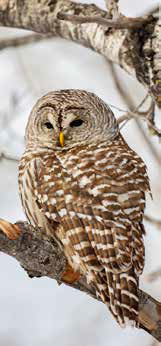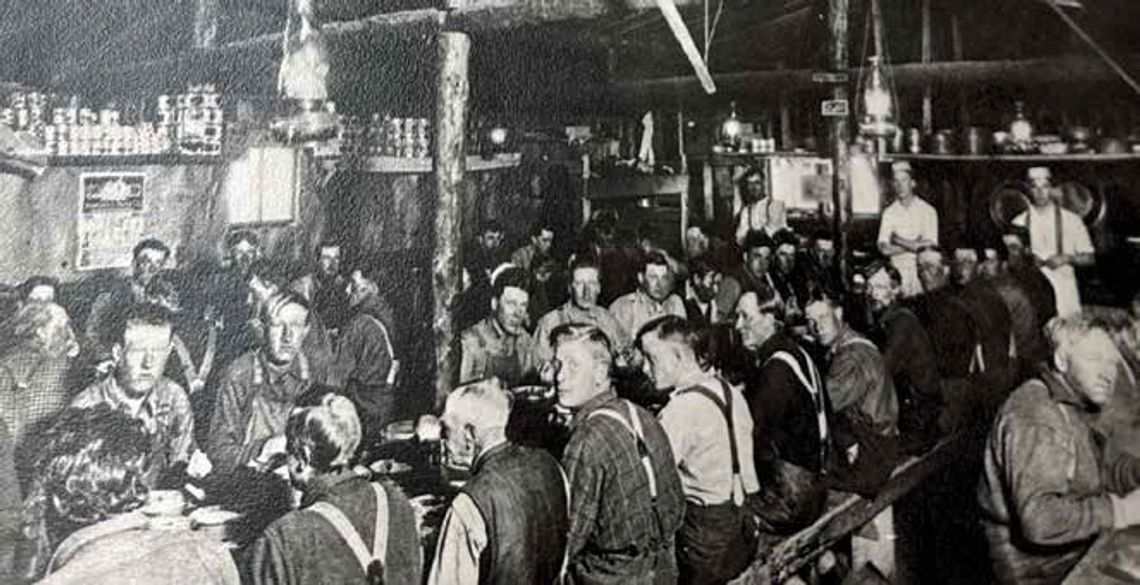My Grandpa Joe was a real lumberjack. He made his way as a sawyer during the winter and a “river pig” when the ice left in the spring and the logs could be driven down to the sawmills. He would spend most of the cold weather from December until March in the logging camps around Bigfork and Craigville.
Grandpa Joe was old before I was born and had long since been unable to live such a life anymore. But he used to sit me on his lap and tell me stories of felling huge trees, unscrambling log jams with his “poke” and of the many interesting characters that would endure the long, hard days and cold winter nights at the logging camps in the 1930s. Cookee was one of those characters.
Logging camps consisted of twenty, thirty or more men who were up before dawn and worked until dark burning lots of energy and calories. It was a monumental task to feed these men, and one of the most important jobs was that of the cooking staff.
Huge breakfasts, lunches take to the lumberjacks in the field and suppers that looked like a Viking feast set on long tables were not only necessary but was important to the reputation of the different logging companies. Pay was important but lumberjacks also took the food into consideration when deciding which outfit to work for. Good cooks had to be organized and able to prepare large amounts of meats, bread, potatoes, eggs, cookies, bacon, pancakes, sauces, canned veggies and pies – oh, the pies! Blueberries, raspberries, Juneberries and strawberries – all preserved and a delight all winter long. Usually it was too much for one cook. The head cook might have one, two or three helpers called “cookees.” One story my Grandpa Joe told me centered around one of these helpers named “Albert.”
Albert didn’t like his name, and when the ‘jacks would call him “Cookee,” he was okay with that.
He was a jovial soul who enjoyed his conversations with the loggers. Cookee worked hard. He hoped he might make a head cook at a camp someday, so he was always looking for ways to learn his craft and impress the owners who might find the need for a cook to take over duties at another camp. He was particularly good with breads and pies and the workers always relished his oatmeal cookies when they came with a midday lunch.
Cookee was in his third winter at my grandpa’s camp. His reputation had grown to the point where his presence was a selling point in attracting the loggers. His days were long. Breakfast had to be ready so that the men could eat and be out in the forest shortly after daybreak. Dishes had to be washed – but to be fair – a second helper in the kitchen usually was assigned this task. Lunches needed to be prepared for noon break and as soon as they were out the door, bread for supper needed to be made, potatoes cooked, and pies put together. Again, clean up after. The workday started at 3:30 a.m. in the morning and ended at about 8 p.m. in the evening. The daily grind was tough, but each of the kitchen staff would get one evening off a week. Cookee had risen enough in the ranks to be afforded Saturday night. He would make the most of it.
After lunch on Saturday, he would prepare the dough for bread and make pie crusts and filling. The other helpers would oversee the baking, and he was done with his responsibilities by four in the afternoon. He was expected to be there and help with light duties the following morning for breakfast. The in-between hours were his.
Cookee had one flaw.
He liked his whiskey.
Alcohol wasn’t allowed in the camps. Camp managers were very strict about this policy. It was one transgression that could get you fired. Cookee knew he couldn’t afford to lose his job, so he followed the regulation on that religiously. He made up for it on Saturday nights.
The logging road down to Craigville and its one lone tavern – Peggy’s at Craigville – was about five miles long. Even after a hard week of work, Cookee’s feet flew down the trail, and his first quarter was on the bar before he even sat down. Now, Peggy’s was exactly what you would picture in your mind if someone threw out the phrase “frontier bar.” It was dark and noisy, usually halffilled with rough talking and unkempt patrons. There was a bottle of “top shelf” whiskey high above the bar, but most drinks came from an old, often re-filled bottle of rotgut. Made no difference. The end result was always the same. Rumor was that a popular business “on the side” took place in some of the boarding rooms upstairs. A game of “cribbage” would be going on at one of the corner tables. Many a lumberjack would spend an entire week’s pay in just a few hours. Or, if too much was consumed too early, he might have what was left of his earnings “lifted” from his back pocket sometime during the evening.
Cookee’s aim was usually to empty a bottle’s worth of rotgut and head back down the trail to camp.
He would enter into good natured banter with other customers, or occasionally play some cribbage, and then stagger his way back down the road. Most weeks he would be back in his bunk by 1:00 in the morning, knowing he could get a little sleep before resuming duties in the morning.
One January night, it all came to an end. It had been a winter of unusually cold weather. This particular Saturday saw some of the worst of it. Cookee finished his chores and headed to Peggy’s as was his habit.
The whiskey tasted good that night. To the other men, he seemed more engaging than usual. He went from barstool to barstool making small talk with anyone that would listen. He lost a bit more than usual at cribbage and stayed an hour later than he would most Saturdays. Finally, he tumbled out the door on his way back to camp. He never made it.
When the head cook started breakfast, Cookee wasn’t there. Sunday mornings sometimes saw Cookee get a late start, but he always showed up. He still wasn’t there when the men came in for breakfast.
One of the other kitchen helpers was sent to get Cookee from his bunk but it was empty.
Work was put on hold, and a search party went out to look for him. He’d made it most of the way but was found frozen solid about a quarter mile from camp. An interesting event was happening around the body. A dozen gray jays were stumbling around and rolling on their backs near Cookee. When approached, they wouldn’t fly away.
Ever being opportunistic and carrion eaters, they had pecked away at Cookee’s flesh until most of the skin on his face and hands were gone. Cookee had so much alcohol in him that the birds became intoxicated from it. From that time on the woodsman started calling Canada jays “whiskeyjacks.”
It was somber around camp. Cookee’s remains were stored in a woodshed until a horse and wagon came to pick him up and bring him home to be buried. The lumberjacks missed Cookee. Partly for his companionship, partly for his pastries and pies.
A couple of weeks later, some of the men at camp had made a similar journey to Peggy’s. They returned to camp out of breath and sweated from running the last mile to camp.
“Cookee’s ghost is haunting the road!” they stammered. “He called out many times and followed us back!”
Incredulous, the other lumberjacks mocked them, sure that the rotgut had played with their minds.
They went a few hundred yards down the trail and came back wide-eyed. They had heard him, too!
“He’s looking for another job in a logging camp!” they exclaimed. “He keeps asking ‘Who cooks for you, who cooks for you’!”
Over the rest of the winter, they could hear his spirit asking for a chance to work again. Usually at night, but sometimes during the day as well.
Cookee’s spirit is still wandering the Northwoods today. I’ve heard him at times. He still wants to be the head cook that he strived for when alive. You might hear him, too. Listen and if he’s around, you’ll hear him ask:
“Who cooks for you?
Who, who cooks for you?”

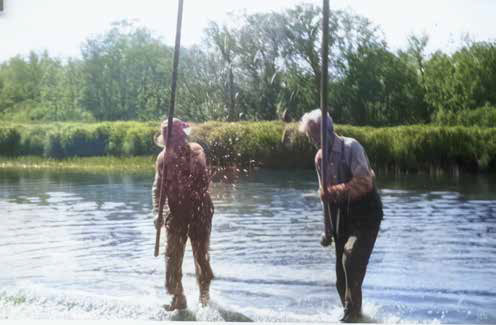
Grandpa Joe on the right, rolling a log
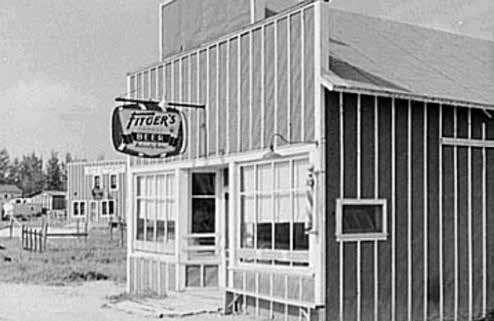
Peggy’s at Craigville
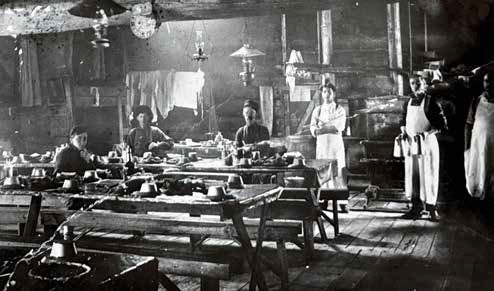

“Whiskeyjack”
